Biology 1023 - Study guides, Class notes & Summaries
Looking for the best study guides, study notes and summaries about Biology 1023? On this page you'll find 93 study documents about Biology 1023.
All 93 results
Sort by
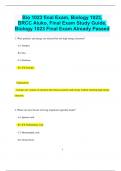
-
Bio 1023 final Exam, Biology 1023, BRCC Aluko, Final Exam Study Guide, Biology 1023 Final Exam Already Passed
- Exam (elaborations) • 50 pages • 2024
- Available in package deal
-
- $11.99
- + learn more
Bio 1023 final Exam, Biology 1023, BRCC Aluko, Final Exam Study Guide, Biology 1023 Final Exam Already Passed 1. What particles and energy are released but not high-energy electrons? - A.) Isotopes - B.) Ions - C.) Neutrons - D.) Isotopes Explanation: Isotopes are variants of elements that release particles and energy without emitting high-energy electrons. 2. Where are most fossils of living organisms typically found? - A.) Igneous rock - B.) Sedimentary rock - C.) Metamor...

-
Biology 1023 Final Exam Questions and Answers Graded A+
- Exam (elaborations) • 15 pages • 2024
- Available in package deal
-
- $9.99
- + learn more
Biology 1023 Final Exam Questions and Answers Graded A+ Which environmental conditions are typically found near or within the hydrothermal vents of Lost City? - A) Intense heat - B) High pressure - C) Basic pH levels - D) Anaerobic conditions - Explanation: All of the above options are correct. These conditions are commonly observed in habitats near or within hydrothermal vents. What gases did Miller and Urey simulate to demonstrate the formation of organic molecules in a primi...
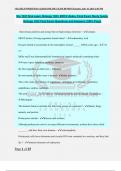
-
Bio 1023 final exam, Biology 1023, BRCC Aluko, Final Exam Study Guide, Biology 1023 Final Exam Questions and Answers (100% Pass)
- Exam (elaborations) • 25 pages • 2024
- Available in package deal
-
- $12.49
- + learn more
Bio 1023 final exam, Biology 1023, BRCC Aluko, Final Exam Study Guide, Biology 1023 Final Exam Questions and Answers (100% Pass)
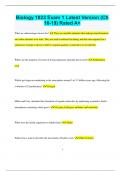
-
Biology 1023 Exam 1 Latest Version (Ch 16-19) Rated A+
- Exam (elaborations) • 9 pages • 2024
- Available in package deal
-
- $9.99
- + learn more
Biology 1023 Exam 1 Latest Version (Ch 16-19) Rated A+ What are radioisotopes known for? They are unstable elements that undergo transformation into other elements over time. They are used in radioactive dating, and the time required for a radioactive isotope to decay to half its original quantity is referred to as its half-life. Where are the majority of fossils of living organisms typically discovered? Sedimentary rock Which gas began accumulating in the atmosphere around 3 to...
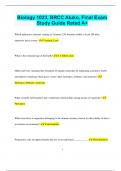
-
Biology 1023, BRCC Aluko, Final Exam Study Guide Rated A+
- Exam (elaborations) • 5 pages • 2024
- Available in package deal
-
- $9.99
- + learn more
Biology 1023, BRCC Aluko, Final Exam Study Guide Rated A+ Which radioactive element, starting as Uranium-238, becomes stable as Lead-206 after numerous decay events? Uranium, Lead What is the estimated age of the Earth? 4-5 billion years Miller and Urey simulated the formation of organic molecules by replicating a primitive Earth atmosphere containing which gases: water vapor, hydrogen, methane, and ammonia? Hydrogen, Methane, Ammonia What scientific field explores the evolu...
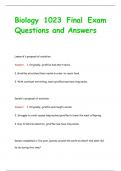
-
Biology 1023 Final Exam Questions and Answers
- Exam (elaborations) • 58 pages • 2024
- Available in package deal
-
- $14.49
- + learn more
Lamarck's proposal of evolution Answer> 1. Originally, giraffes had short necks. 2. Giraffes stretched their necks in order to reach food. 3. With continual stretching, most giraffes now have long necks. Darwin's proposal of evolution Answer> 1. Originally, giraffe neck length varied. 2. Struggle to exist causes long-necked giraffes to have the most offspring. 3. Due to natural selection, giraffes now have long necks. Darwin completed a five-year journey around the world on what?...
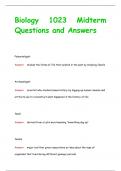
-
Biology 1023 Midterm Questions and Answers
- Exam (elaborations) • 26 pages • 2024
- Available in package deal
-
- $12.49
- + learn more
Paleontologist Answer> studies the forms of life that existed in the past by studying fossils Archaeologist Answer> scientist who studies human history by digging up human remains and artifacts use to reconstruct what happened in the history of life fossil Answer> derived from a Latin word meaning "something dug up" fossils Answer> major tool that gives researchers an idea about the type of organisms that lived during different geologic periods classes Answer> Based...
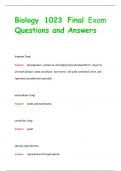
-
Biology 1023 Final Exam Questions and Answers
- Exam (elaborations) • 55 pages • 2024
- Available in package deal
-
- $13.79
- + learn more
Kingdom Fungi Answer> decomposers, contain no chlorophyll (non photosynthetic, majority are multicellular, some unicellular, non-motile, cell walls contained chitin, and reproduce sexually and asexually multicellular fungi Answer> molds and mushrooms unicellular fungi Answer> yeast asexual reproduction Answer> reproduction through spores sexual reproduction Answer> reproduction through mating of hyphae filaments Mycelium Answer> distinctive body; composed of micr...

-
Biology 1023 Final Exam Questions and Answers (100% Pass)
- Exam (elaborations) • 9 pages • 2024
- Available in package deal
-
- $12.49
- + learn more
Biology 1023 Final Exam Questions and Answers (100% Pass)
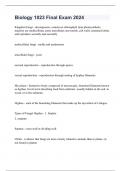
-
Biology 1023 Final Exam 2024
- Exam (elaborations) • 30 pages • 2024
- Available in package deal
-
- $13.99
- + learn more
Kingdom Fungi - decomposers, contain no chlorophyll (non photosynthetic, majority are multicellular, some unicellular, non-motile, cell walls contained chitin, and reproduce sexually and asexually multicellular fungi - molds and mushrooms unicellular fungi - yeast asexual reproduction - reproduction through spores sexual reproduction - reproduction through mating of hyphae filaments Mycelium - distinctive body; composed of microscopic, branched filaments known as hyphae. Involved ...

How much did you already spend on Stuvia? Imagine there are plenty more of you out there paying for study notes, but this time YOU are the seller. Ka-ching! Discover all about earning on Stuvia


